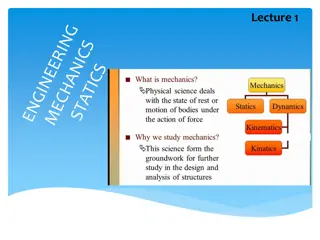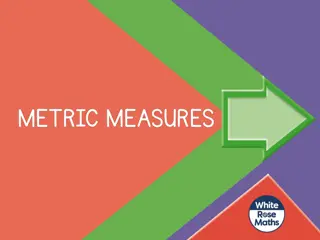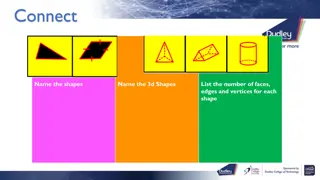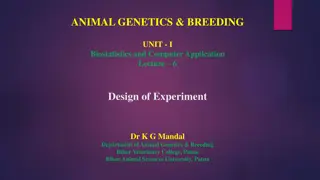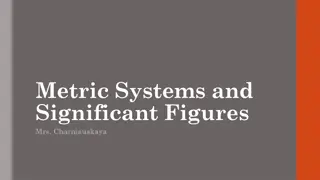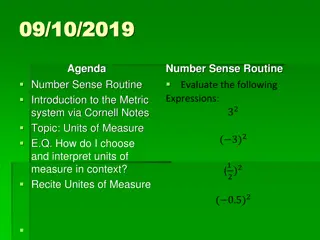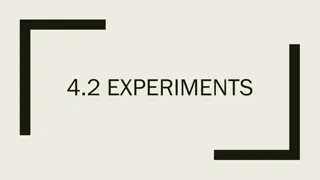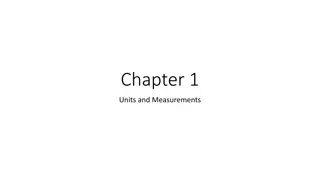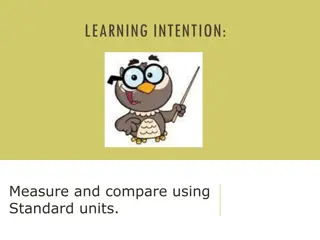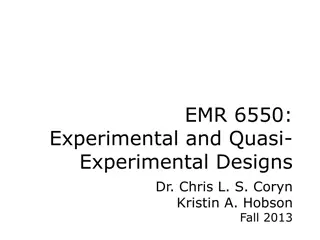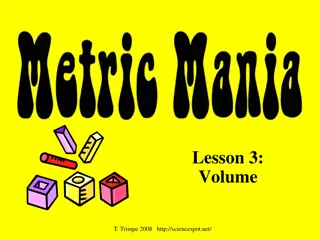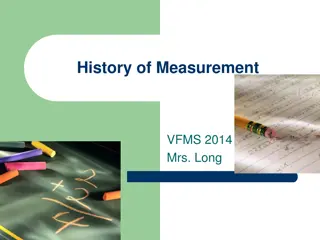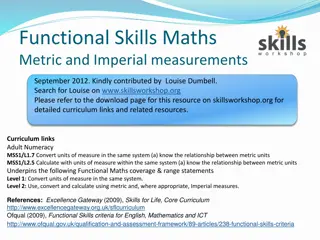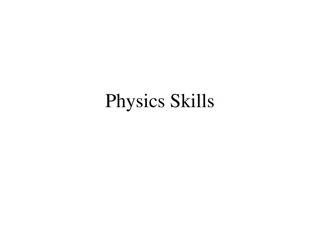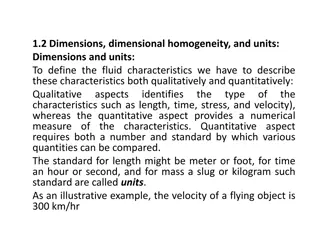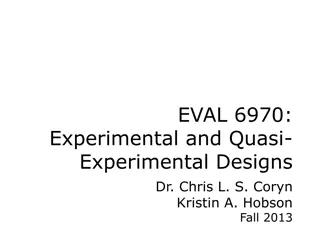Multiplying recruiting units
This presentation delves into the key relationships between church growth and the number, age, and mission of church units, emphasizing the correlation between membership strength and the number of units. It also discusses the importance of starting new churches for denominational growth, Sunday sch
2 views • 28 slides
Introduction to Experimental Economics by John Hey: A Comprehensive Overview
Explore the interconnected realms of Experimental Economics and Behavioral Economics through the insightful lectures of John Hey, an Emeritus Professor at the University of York. Discover the methodology of testing economic theories for validity and the practical applications of experimental economi
1 views • 58 slides
Insights on Experimental ASF Vaccines in Pig Studies
The research conducted by Prof. Jishu Shi and his team at Kansas State University delves into the safety and efficacy testing of experimental African Swine Fever (ASF) vaccines using pigs as the model. Various vaccines, including DNA vaccines and live attenuated viruses, were tested against differen
4 views • 13 slides
Fundamentals of Mechanics: Introduction to Basic Quantities and Units
Explore the foundational concepts of mechanics in this introductory lecture, covering basic quantities like length, time, mass, and force. Learn about idealizations, units of measurement, SI units, conversion of units, and prefixes used in the context of mechanics.
3 views • 7 slides
Understanding Customary Units of Capacity
Explore the world of customary units of capacity including ounces, cups, pints, quarts, and gallons. Learn how these units are used in measuring liquids, such as fluid ounces, cups, pints, and more. Dive into the fascinating story of the kingdom of GALLON and its royal family. Discover practical exa
0 views • 15 slides
Understanding Metric Measurements and Units
Exploring various metric units for measuring length, mass, and capacity. Matching lengths to sensible estimates, defining mass, length, and capacity, and sorting metric units into appropriate categories. Determining the most suitable units to measure mass and capacity for different objects and estim
0 views • 14 slides
Understanding Metric Units of Measurement in Mathematics
Explore the world of metric units in mathematics through the measurement of length, weight, and capacity. Learn about converting between units and applying these concepts to real-world scenarios. Discover the properties of shapes and delve into 3D shapes by counting faces, edges, and vertices. Engag
1 views • 21 slides
Understanding Nonexperimental and Quasi-experimental Studies
Nonexperimental and quasi-experimental studies resemble experiments but lack random assignment, making them valuable for group comparisons without establishing causation. This type of research design looks at differences between groups that already exist, focusing on group differences rather than ca
1 views • 35 slides
Design of Experiment in Animal Genetics & Breeding: Principles and Methods
Biostatistics and computer applications play a key role in the design of experiments in animal genetics and breeding. Proper allotment of treatments to experimental units is crucial to study treatment effects accurately. Designing experiments helps in maximizing information from available resources,
0 views • 37 slides
Understanding Metric Systems and Significant Figures
Scientists worldwide use the SI system to communicate clearly, based on units like meter, gram, and liter. Learn about base and derived units, SI base units like second and kilogram, and derived units like volume. Discover which unit (millimeter, centimeter, meter, or kilometer) to use for different
0 views • 36 slides
Understanding Units of Measure in Math and Science
Introduction to units of measure including the metric system and US/Customary system. Learn about the basics of measuring length, volume, weight, and mass. Explore different units such as meters, liters, and grams, and understand the importance of choosing and interpreting units in various contexts.
0 views • 17 slides
Understanding Experiments in Research: Observation vs. Experimentation
Observation and experiments are two crucial methods in research. An observational study involves observing and measuring variables without influencing responses, while an experiment deliberately applies treatments to measure responses. Confounding variables can affect the results, and factors like e
0 views • 13 slides
Understanding Experimental Psychology: Designs and Control Issues in Research
This content delves into the basics of experimental research, focusing on different types of experimental designs and control issues. It covers between-group and within-group designs, discussing advantages and disadvantages, as well as methods for controlling for nonequivalence. The importance of ra
0 views • 26 slides
Understanding Units and Measurements in Physics
Physics is the study of nature and its phenomena, involving various physical quantities like mass, length, time, area, and volume. These quantities can be fundamental or derived, with units selected as standards for measurement. The System International (SI) units offer advantages like coherence, ra
0 views • 14 slides
Understanding Probability: Experimental and Theoretical Concepts
Probability is the measure of the likelihood of an event happening, with experimental and theoretical probability being key concepts. Experimental probability involves determining probabilities through experience or experiments, while theoretical probability can be calculated without prior experienc
2 views • 23 slides
Academic Planning Training Summit Exec Order 1071 - Units & Concentrations
Explore Executive Order 1071 delegating authority for subprograms in academic planning. Learn about counting units, adding concentrations, and major requirements. Guidance documents and comparisons help understand the core curriculum and exclude elective units. Dive into discipline major units, conc
0 views • 12 slides
Introduction to Masonry Units in Construction
Masonry units, such as stone, blocks, or bricks, combined with mortar, are essential in construction, with examples seen in the pyramids of Egypt and the Great Wall of China. Structured and non-structured masonry types serve different purposes, with concrete masonry units being widely used. Solid co
1 views • 33 slides
Understanding Scientific Method and Units in Chemistry.
Learn about designing controlled experiments, identifying variables, and understanding constants through scenarios involving bacteria cultures and pizza grease comparison. Explore the differences between theory and law in scientific context, and discover the base units and metric units used in chemi
2 views • 30 slides
Quiz Review on Scientific Method and Graphing
Explore a quiz review covering topics related to scientific method, graphing, and experimental design. Understand key concepts such as hypothesis, scientific law, theory, variables, and experimental control through detailed questions and images. Test your knowledge on laboratory safety, inferences,
0 views • 14 slides
Proposed Stock Complex Amendments for Caribbean Reef Fishery Management Units
Amendments proposed for the reef fishery management units in Puerto Rico and the U.S. Virgin Islands include changes to stock complexes for parrotfish, grouper, and snapper units. The proposal suggests separating parrotfish units, modifying grouper units, and adjusting snapper units. Additionally, t
4 views • 72 slides
Understanding Quantitative Research Designs in Nursing
Delve into the world of quantitative research in nursing, exploring different research designs and the concept of causality. Learn about experimental, quasi-experimental, and non-experimental designs, as well as the characteristics of experimental design like manipulation, control, and randomization
0 views • 22 slides
Measurement Comparison Activities for Learning Standard Units
Engage in interactive activities to practice measuring and comparing using standard units like centimeters, millimeters, meters, and kilometers. Test your knowledge with true or false questions and choose the correct units for various objects. Enhance your understanding of measuring tools and units
0 views • 20 slides
Quasi-Experimental and Interrupted Time-Series Designs Overview
Explore the various quasi-experimental designs, control groups, pretests, and outcome patterns in research methodologies. Understand the implications of different outcome patterns on causal interpretation and validity threats in experimental studies.
0 views • 31 slides
Understanding Volume Measurement in Metric Units
Explore the concept of volume measurement in metric units through lessons on English vs. metric units, measuring liquid volume with graduated cylinders, and calculating solid volume using formulas. Understand the relationship between liters, milliliters, and other units, and learn practical techniqu
0 views • 6 slides
Walton High School Academic Program & Graduation Requirements
Walton High School aims to educate, inspire, and empower students in the Class of 2028 through a structured academic program. The school follows a 7-period day system where students take six classes and have lunch. With a total requirement of 24 units over four years, each class earns 0.5 units of c
0 views • 33 slides
Evolution of Measurement Systems Over Time
Explore the fascinating journey of measurement systems from historical units like cubit and fathom to the modern metric system. Discover how civilizations developed standardized units for length, weight, and mass. Follow the timeline of measurement advancements, from King Edward's iron ulna to the b
0 views • 36 slides
Understanding Experimental Design in Biology
Explore key concepts in experimental design in biology through clicker questions focusing on hypotheses, variables, control groups, and experimental groups. Learn how scientists test hypotheses and analyze results to draw valid conclusions in biological studies.
0 views • 15 slides
Compilation and Evaluation of Experimental Data for Nuclei in Z=2-28 Region
Completed compilation and evaluation of experimental Pn and half-lives for nuclei in the Z=2-28 region, led by Balraj Singh at McMaster University. The work involved preparing lists of neutron-rich nuclides, identifying potential emitters, analyzing available experimental data for 1n, 2n, 3n, and 4n
0 views • 20 slides
Advances in Ceramic Composite Property Modeling and Experimental Characterization
European research focuses on advanced modeling of C/C, C/SiC, and SiC/SiC composites for aerospace and nuclear applications, with an emphasis on correlating simulations with experimental validation. Laboratories are progressing towards a multiscale approach, integrating micro/nanomechanical characte
0 views • 5 slides
Evolution of the International System of Units (SI) and Its Base Units
The International System of Units (SI) was introduced in France in 1840 and became globally accepted by the mid-20th century. SI is mandatory in Estonia since 1982, with base units including meter, kilogram, second, ampere, kelvin, candela, and mole. Each base unit is defined by specific physical co
0 views • 22 slides
What Motivates Paternalism? An Experimental Investigation
Centuries of normative debate on paternalism have resulted in its ubiquity in various aspects of society, from consumer protection to safety regulations. However, there is a scarcity of empirical studies on the motivations behind paternalistic interventions. This experimental investigation delves in
0 views • 12 slides
Understanding Experimental Studies: Intervention, Characteristics, and Measurements
Experimental studies involve the investigator assigning exposures and following subjects to observe disease development. Different types of experimental studies exist, such as preventive and therapeutic types, each with its limitations, including ethical concerns and challenges in recruiting subject
0 views • 13 slides
Understanding Metric and Imperial Measurements in Maths
Explore the world of metric and imperial measurements in mathematics, covering units for length, mass, and capacity. Learn conversion rates and relationships between different units, enhancing your functional maths skills at levels 1 and 2. Discover the significance of milli-, centi-, and kilo- pref
0 views • 11 slides
Understanding Units of Measurement in Physics
Explore the world of physics through the lens of units of measurement, including the Metric System and MKS/SI base units. Learn about the standard kilogram, meter, and second, as well as derived units and the process of converting units in the Metric System.
0 views • 22 slides
Understanding Dimensions, Dimensional Homogeneity, and Units in Fluid Mechanics
Qualitatively and quantitatively defining fluid characteristics involves dimensions and units such as length, time, stress, and velocity. Primary units like Length (L), Time (T), Mass (M), and Temperature provide a basis for describing secondary quantities. Dimensional homogeneity equations play a c
0 views • 19 slides
Understanding Research Methods and Data Analysis
This review covers topics such as experimental classification, the comparison of non-experimental and experimental research, software features like JMP and SPSS, outlier handling in data analysis, and levels of measurement in statistical analysis.
0 views • 13 slides
Vietnam Neutrino School Overview
Vietnam School on Neutrino is an annual event started in 2017 to promote experimental neutrino physics in Vietnam. Led by Prof. Jean Tran Thanh Van, the school focuses on lectures, software and hardware training, group works, and excursions. With a mix of students from various countries, the aim is
0 views • 7 slides
Understanding Experimental and Quasi-Experimental Designs
Explore the foundations of experimental and quasi-experimental designs, delving into causal relationships, counterfactual reasoning, and the importance of validating statistical and internal conclusions. Learn about causes, effects, and the complexity of determining causation in research. Discover R
0 views • 46 slides
Understanding Experimental Studies in Epidemiology
Epidemiological studies and experimental studies play vital roles in understanding cause-and-effect relationships in research. Experimental studies involve manipulating independent variables and measuring dependent variables, with categories such as true experimental, quasi-experimental, and pre-exp
0 views • 22 slides
Enhancements to CRIA2 Program for Tracking ARP Funded Services
The CRIA2 program now allows for tracking of ARP service units with added ARP Service Types. Agencies can contact the NWD Helpdesk for support on tracking ARP services. The Units Entry screen in CRIA Encounters is used to enter and track service units for encounters where ARP services will be tracke
0 views • 8 slides



